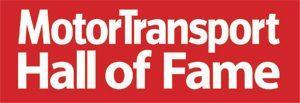
It has been over 30 years since the Motor Transport Awards began back in 1986 and throughout these three decades, we have marked the achievements of individuals who have made an outstanding contribution to the road transport industry.
This recognition has taken many forms. During the late 1980s and early 1990s it took the shape of the Special Award, before disappearing for a while in the late 1990s. It returned again in the mid-2000s, firstly as the Lifetime Achievement Award, then as the Local Hero Award, before beginning a now uninterrupted run as the Service to Industry Award which was presented for the 15th time at the 2020 Awards.

Motor Transport has always sought to recognise the achievements of those that have made a significant contribution to the road transport industry, which is why we hold the annual induction to the Hall of Fame in association with Brigade Electronics at the Motor Transport Awards.
We do this to recognise the efforts and achievements of individuals in ensuring the UK logistics, supply chain and commercial vehicle industry maintains its class-leading standards and traditions.
All winners of the Service to Industry Award (see list below) are automatically inducted into the Hall of Fame as the individuals who have created a lasting legacy by upholding the highest standards and traditions in the industry.
Alan Jones CVO OBE, former MD, TNT UK
Alan Jones CVO OBE, former MD of TNT UK, left school in 1964 to join the Midlands Electricity Board as an apprentice accountant. At the age of 21 after completing his five-year apprenticeship Jones took on his first leadership role in charge of 26 staff at the Board’s Birmingham area office followed by progressively more senior financial management jobs with Norweb and then the BBC.
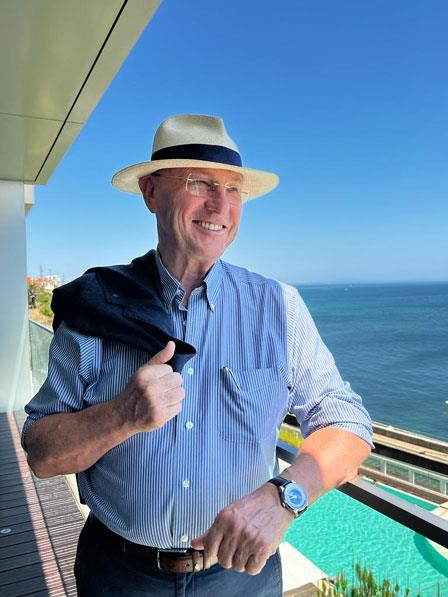
His transport career started in 1974 when he joined Pickfords Heavy Haulage, a subsidiary of the National Freight Corporation (NFC), as finance director and one year later he took on his first general management job. In the next five years as a regional director managing more than 2,000 staff within Roadline, another NFC company, he identified the unmet need for a nationwide guaranteed next day parcels delivery service. This led to him joining TNT in 1980 as general manager of newly-formed TNT Overnite.
After 18 months of explosive growth TNT Overnite was producing revenues of £1m per week - almost as much as the sales of all the six regions of Roadline put together.
TNT continued to grow rapidly as Jones launched the first on-demand, door-to-door nationwide next morning and round the clock same day delivery services in the British Isles. By 1984 he had become director and general manager of TNT Roadfreight UK and after creating TNT Logistics (now CEVA Logistics) he was appointed MD TNT UK in 1985.
In January 1986 TNT hit the headlines when it started to deliver Rupert Murdoch’s national newspapers out of his new printing plant in Wapping and this marked the beginning of a revolution which transformed the national newspaper industry in Britain. Thousands of print trades union members picketed the gates at Wapping night after night while more than 1,100 violent attacks were mounted on TNT’s vehicles and depots.
The newspapers were previously moved by rail and the print unions had relied on unionised railway workers to block the distribution of Murdoch’s titles. The move to road haulage was an historically significant move and helped all publishers break the unions’ stranglehold over the national newspaper industry. TNT’s supply chain innovations also gave publishers two-hour reductions in transit times across the country, enabling them for the first time to include the results of evening football matches in their first editions through the extension of print deadlines to 10pm.
In the next decade TNT UK gained a monopoly over the primary distribution of national newspapers by providing the fastest and most reliable nationwide delivery services.
TNT UK grew organically to employ 16,000 people while achieving continuously improving profits and strengthening its position as the market leader in the British express delivery industry. It also dominated several sectors of the third party time sensitive logistics industry while winning along the way many awards including 33 Motor Transport Awards, a record that stood until 2020.
In July 1999 Jones became a member of the board of management of TNT Post Group and until the end of 2003 was group MD of TNT Express with a global workforce of approximately 45,000 people in 62 countries.
After a rewarding period as a senior industrial advisor at Apax Partners he took on in 2005 the role of CEO at GSL, a private equity backed global provider of mission critical services employing 10,000 people and using the Investors in Excellence standard. Profits were tripled in two years upon which the business was sold to achieve an excellent return on invested capital.
Jones is a fellow of the Association of Chartered Certified Accountants as well as a past chairman of the Chartered Institute of Transport and received an OBE in 1996 for services to the transport industry. Twenty years later he was made a Commander of the Royal Victorian Order (CVO).
Bob Swain, chairman, Swain Group
Bob Swain is chairman of national distribution business Swain Group, the great great grandson of the founder and the fourth generation of the family to own and run the business. A full service logistics operation, Swain Group has grown organically and through a series of acquisitions services and now runs 600 vehicles.
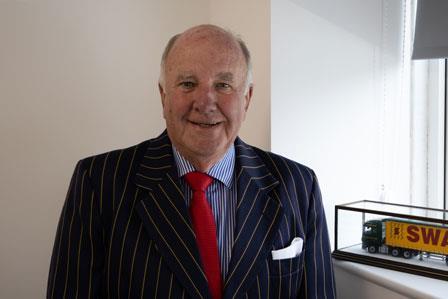
Founded in 1918 and formally incorporated as R Swain & Sons in 1926, the company is still based in Rochester and remains 100% family owned. The group has grown rapidly in the last decade fuelled by a series of acquisitions, though two thirds of the group fleet still wears the dark green R Swain livery. In the year to January 2022 it delivered a pre-tax profit of £763,083 on turnover £57.7m.
As the group has grown, so has the diversity of the fleet and now encompasses curtainsiders, heavy haulage, project management, containers and bulk transport. It remains however the pre-eminent construction delivery business within the South East with a large flatbed fleet and five depots circling London.
With a lifetime in the logistics industry, Swain now 76, has witnessed dramatic changes within the world of distribution.
After spending his early working life travelling the world to gain broader experience in logistics and commerce Swain joined the family business run by his father in 1973 within R Swain and Sons, the annual turnover at this time was in the region of £100,000.
Even in these early days he had a vision for the business. R Swain and sons had already established themselves in North Kent as a flatbed haulier with specialisms in the distribution of steel and fabrication. Between 1975 and 1978 Swain was instrumental in winning several large contracts which resulted in the company’s turnover increasing to several million. Throughout the 1980s and 1990s the company continued to grow in terms of turnover and by acquisition.
As chairman of what is now the Swain Group, he is at the head of a large national business which operates from 11 locations and boasts an impressive array of businesses. Alongside the R Swain and Sons’ business, eight other businesses now form the Swain Group, including Hallett Silbermann (Heavy Haulage) Express Freight Services (container distribution) and Swain Special Projects (abnormal loads and lifts), each division complementing the service portfolio and playing its part in fulfilling Swain’s vision for the business.
Amongst its 600 staff, the company has many times served employees who have worked for R Swain and its associated business for an entire working life and they all know Swain and have stories to tell! But any new driver to the business who embarks on a driving career will have wise words offered by those who know, especially if Swain is on the prowl:
- Keep your cab clean.
- Count your straps and chains.
- Know your vehicle (inside and out)
And of course, for the engineers and fleet managers, they all abide by the Bob Swain mantra:“Don’t ever throw anything away, you never know when you might need it!”
Robert Wilcox, MD, Massey Wilcox
Robert Wilcox is MD of Massey Wilcox Transport, a family owed haulage company based some 10 miles south of Bath and with a further depot in Avonmouth.
The business was established in 1954 by his father Harry, and business partner Doug Massey following denationalisation of road transport which the partners saw as their chance to own and operate their own fleet.
They started with two worn out Bedford 5-tonners, ex-BRS Thatcham, the value being in the “A” licence that each lorry had allocated to it.
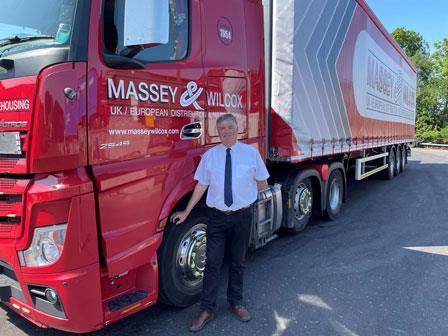
Locally sourced traffic including stone and tarmac from the many quarries on the Mendip Hills along with butter, cheese, paper products and Babycham, got the vehicles out and then back loads of feed ingredients to a local agricultural mill in Midsomer Norton where the pair where both drivers following demob from the Second World War.
From the beginning empty running was not an option, just as it is today.
Wilcox joined the company at sixteen in 1973 and after a year in the workshop followed a few years driving an 8.5-tonne Bedford TK, his ambition to gain his Class 1 licence at 21 was put on hold when Doug Massey suffered a severe stroke at just 54.
With his new position in the traffic office Wilcox soon identified that groupage was a more profitable sector than the normal full load traffic, and within a few years had the country covered with the fleet and partnerships with other hauliers.
By 1978 the company was able to afford a 5.5-acre site in Chilcompton and the extra space was used to develop warehousing. A further 5 acres was purchased nearby in 1995 and the Avonmouth depot with 175,000sq ft of warehousing was established in 2002. The two sites ideally placing the company to serve distribution contracts for South West and UK-wide companies.
With the arrival of pallet networks in the early 1990s, Wilcox saw that the groupage work would come under attack. The company became a member of Pall-Ex in 1998 and then Pallet Track in 2015.
The company was invited to join the Transport Association (TA) in 1991 and the first meeting attended was a little overawing. The room was full of long-established family hauliers whose names dominated the haulage world. However, over time Wilcox got to know the principals personally and soon learnt that all members suffered from the same everyday problems just on differing scales.
He became chair of the TA from 2014 to 2016 and even after 32 years still looks forward to the meetings and what can be learnt from them. The TA is non-political body but considered a family and self-help group. Wilcox is also an RHA board member, the association his father and partner joined in 1954.
With the driver shortage that really came to the fore during the pandemic easing thanks to the efforts and campaigning by the RHA, today’s issue is the shortage of LGV technicians. Just as serious as the driver shortage but not so easily fixed and naturally, a regular discussion point within the TA and campaign objective for the RHA.
Today the company operates 70 vehicles and 120 trailers along with over 300,000sq ft of warehousing, employs 120 local people and turns over around £14m a year.
One industry observer says of Wilcox: “Robert has been a leading figure in the highly respected Transport Association for many years. He has demonstrated the value of how private family-run businesses, with their ability to collaborate and cooperate on a national level, consistently achieve, and maintain elevated levels of performance and profitability.”
Lesley O’Brien OBE, MD, Freightlink Europe
Lesley O’Brien OBE has been joint MD of Freightlink Europe since 2008 and modestly – though accurately – describes herself as a “champion for the road transport industry, passionately changing perceptions and raising standards; an advocate for women, always authentic, enthusing, empowering and encouraging others”.
She has earned a well-deserved reputation for promoting the transport industry as a career choice to women and other minority and less privileged groups, and in 2017 persuaded the RHA to set up She’s RHA, with the aim of promoting diversity and inclusivity in transport.

In 2020 O’Brien received an OBE in recognition of being the driving force behind the creation of She’s RHA.
O’Brien started out in the transport industry working for an international haulier and set up Freightlink Europe with husband and business partner Kevin O’Brien in 1995. The 25-vehicle haulier recently relocated from Bradford to Halifax in West Yorkshire.
It was one of the first participants in the pilot for the DVSA’s Earned Recognition scheme, and after initial scepticism O’Brien has become a positive advocate of the voluntary scheme.
O’Brien also runs sister company, Freight Train, specialising in Driver CPC training, transport consultancy, transport audits and compliance. In January 2020 O’Brien launched Freight People, a monthly forum for the transport community which offers expert presentations on an industry hot topic and a space to share common issues and best practice. The focus is linking transport people of all ages and skill sets to share information and best practice, encourage and support one another, to provide access to industry professionals to assist with compliance with industry standards and to provide continuous professional development.
As well as running Freightlink Europe, Freight Train and Freight People, O’Brien somehow finds the time to be a trustee of the RHA Benevolent Fund and served nine years as an RHA board director.
In 2014 she was named Yorkshire Business Woman of the Year and in 2022 was added to the list of Northern Power Women.
O’Brien uses her voice whenever possible to support and encourage those under-represented in the transport industry, to raise standards, improve road safety and change perceptions of the industry. She is also vocal in her calls for better regulation of the driver agency sector.
O’Brien has become one of the BBC’s ‘go-to’ people for comment on all things transport and regularly speaks on behalf of the industry on issues ranging from fuel duty to driver shortages.Her hobbies include keeping fit, entertaining at home, cinema, travel and “keeping husband Kevin in line!”
Bob Terris, chairman, Meachers Global Logistics
Bob Terris, chairman of Meachers Global Logistics, celebrated his Diamond Jubilee in 2022 after joining the Meachers family coal merchant and transport company on 1 April 1962, aged 17.
Starting from a small hut in a gravel yard in Westfield Road in Totton near Southampton, the company now has a turnover of over £56m, operates 500,000sq ft. of warehousing and runs a fleet of 80 trucks.
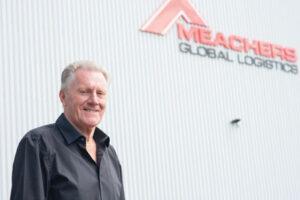
Terris was born in Bristol, but moved to Southampton in 1962 and joined former coal merchant Fred Meacher and his three sons at Meachers Transport, which had been formed in 1958, in the role of traffic controller, the first employee outside the Meachers family.
Under Terris’s stewardship, the Meachers business has grown and expanded its service offering to include freight forwarding and 500,000sq ft of storage on seven sites around Southampton and a transport depot near Derby. In 2009, the company rebranded as Meachers Global Logistics to reflect these wider range of services though the fleet of 80 vehicles still brings around 50% of revenue however.
Terris says: “We’ve had tough times, been through several recessions, national dock and lorry drivers’ strikes, complex global supply chains and the challenges of Brexit and Covid more recently.“
I was born the day before D-Day so while I don’t remember the War we have seen a lot of changes over the years. If you think of the conditions drivers used to work under - the long hours, the pay and the type of vehicles they had to drive – and all the strikes we had, it was a mess really.
”There have been huge improvements in the standards in our industry.”
Terris is a strong advocate of road transport as a great career choice.
“We don’t promote our industry enough - every time we get an opportunity to speak at schools or universities we tell people how important we are,” he says. “There will always be jobs in this industry because you can’t sell anything unless you move it. So there will always be a transport industry, though what it will look like and how many people will be involved in it is open to discussion.”
Like many people with long experience Terris says the principles behind running a successful transport business are simple – it is just the execution that is hard.
“You need three things to be successful in our industry – volume, mix and price,” he says. “You can have as much volume as you like but if it doesn’t fit properly or you don’t get the right price you will never make any money.“
Too many people do not pay attention to the detail – they think if the wheels are running they are making money but that is not always the case.”
At 77, Terris is still in the office every day and immersed in the business. When he does take time to relax, Terris enjoys playing golf and watching sport, especially football and cricket - he’s honorary vice president of Hampshire Cricket. He enjoys gardening at his home in Hampshire and spending time with his wife Josie and their family. He says: “It’s 60 not out for me! The plan is to carry on as long as I feel I’m making a contribution - I love it.”
Mike Daly, founder, Daly Transport Services
Mike Daly describes himself as a “classic working class boy made good” – but can without exaggeration claim to have invented today’s fashion logistics sector.
After leaving college Daly bought a van and started in the removals business using an old gas pipe to hang his customers’ clothes. One day a customer in the fashion business rang and asked him to move some garments.
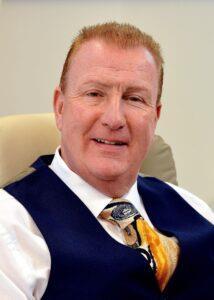
Daly says: “He said, ‘I’m in the rag trade and my transport company’s let me down. I noticed in your van, you had one hanging rail. Could you come and move some garments for me?’
“I said, ‘yes, certainly. How many garments have you got?’ He said, ‘2,000 blouses.’ So I went down to the local scrap yard, bought more gas pipe and cut it up. After fixing it in the back of the van I then had about 12 hanging rails. I picked up the 2,000 tops and drove out of London to C&A’s distribution centre in Woking.”
And that is how Daly Transport Services was born in 1986. From there the business grew to include warehousing, labelling and repricing.
“We started growing with a few more trucks every year, funded through trading profits,” says Daly. “Then a customer would say to me, ‘Mike, I need 3,000 garments out of that factory before he shuts for the summer, can you collect them and look after them for me?’ I took a little warehouse and I got more of this gas tubing and put up. It actually looked like a kids’ climbing frame, my very first warehouse, just galvanised pipe everywhere.
Daly was approached by several major names wanting to buy DTS, but in 2005 decided Clipper Logistics boss Steve Parkin was the right man to do the deal with.
The two businesses were a good geographical and cultural fit, and Daly felt it was the right time to take his foot off the gas.
“Steve Parkin approached me and said ‘you’re strong in the south, I’m strong in the north, why don’t we merge’. He was a fellow working man made good and this approach from a like-minded person came at the right time,” he says. “I was only 50 when I sold to Clipper and I probably was a bit of a workaholic.”
For two years after Daly sold DTS he was full-time sales director of Clipper, spending much of his time travelling the UK to visit the firm’s 17 depots once a month. After two years on the road, Daly wanted to take more of a back seat, becoming a non-executive director and latterly an adviser to Clipper in between running his farm and being a Transaid ambassador. Daly’s support is invaluable to Transaid and he raises tens of thousands of pounds for the organisation through its annual Christmas appeal. Just as important, he champions Transaid through his extensive network of contacts and supports the charity at a range of industry events.
Daly says: “When I sold, I thought ‘I’m going to give a bit back. I’ve time now’. Transaid needed someone from the industry, helping man the stands at shows, who can talk the language of a logistics owner’.
“So Transaid started an official ambassador programme and now there are over 20 of us. With the 12 employed staff, 20-plus ambassadors and the employees of our 33 corporate members, we are saving lives and achieving quite a lot together.”
Andy Boyle OBE, founder, ABE (Ledbury)
Andy Boyle OBE set up Andy Boyle Enterprises in May 1972, a firm later and better known as ABE (Ledbury). He ran it for 45 years before selling to Palletline in 2017.
In the early days, most of the work came from the agriculture and horticulture sectors in Herefordshire and the company had just two vehicles, both Seddons, and both described as “knackered”, received in lieu of a debt repayment.
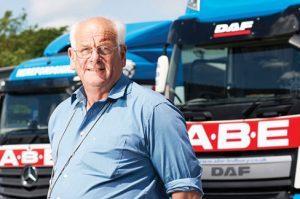
ABE became a limited company in 1989 and was an early adopter of the mobile phone, after many years of drivers hunting for coins and phone boxes.
The company was hit hard by the early 1990s recession and Boyle nearly decided to hang up the keys to the trucks. Diesel prices virtually doubled and the firm lost its biggest agricultural customer. But typical of Boyle’s entrepreneurial spirit, ABE joined what was then the newly established co-operative, Palletline, enabling it to move smaller consignments of pallets across the UK.
ABE took full advantage, doubling in size with a variety of customers at the beginning of online trading. It also established a relationship with Partnerlink, enabling the company to make new trading partnerships and improve environmental performance by reducing empty running.
Four years ago, Boyle decided it was time to reduce his work commitments and the business was sold to Palletline. The move was considered to be the best option, as it meant the company remained exactly the same in its ethos – which is all about reliability, honesty and communication.
Boyle believed these were essential ingredients for building successful business relationships, and as the business has grown he has developed a professional workforce who share these values; they genuinely care about customers and take pride in their work. He has ensured that all relationships – be they with customers, staff or suppliers – are nurtured towards long-term partnerships.
Far from retiring, however, Boyle has kept himself busy. He served on the board of the RHA for 26 years and was made chair in 2008. In addition, he has been a committed campaigner against fuel duty rises.
Paying tribute to Boyle, one senior industry figure said he had been a “stalwart of the RHA” and that he was “logical, personable and very approachable”.
Another said: “Andy is an exemplar of decency as a businessman and operator, combined with a commitment to the wider industry demonstrated by his length of service to the RHA.” He was also described “a rock” when, during his chairmanship, the RHA nearly went bust during the financial crisis in 2008/09.
Jim French MBE, MD, Road to Logistics
Jim French MBE describes himself as “a trucks and sheds man” through and through, though that does his long and varied career in the logistics industry something of a disservice. He started with BRS straight from school as a branch manager in Hereford before moving on to Exel Logistics, and worked for some of the doyens of the NFC, including Robbie Burns, Steve Abel and Gerry Brown.
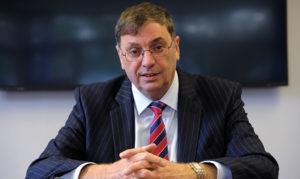
“I worked for Exel in different parts of the country right up until 1997,” French says. “It was an exciting time particularly at the start of the 1980s, when contract logistics was booming.”
French was later approached by another Exel alumnus, Ian Veitch, to work with him at UCI, which then became NYK and later Yusen Logistics. “I did that for five years, and then in 2003 Graham Roberts, who had previously been an NFC board member, became the chief executive of PD Ports and he asked me if I would like to join him.”
In 2019 he retired from his full-time role as director of portcentric logistics at PDP, but he remains actively involved in the industry as MD of the RHA’s Road to Logistics and co-chair of the Trailblazer Group for Transport and Logistics apprenticeships, where he fought long and hard to increase funding for the Category C+E LGV driver apprenticeship.
When RHA national chairman, French made it a priority to promote initiatives to attract young people into the sector. In fact, bringing in people to the industry has always been one of his passions.
French is a strong supporter of High Tide, a charity that helps young people enter the world of work, and Think Logistics, a scheme to encourage hauliers to promote the logistics industry to local schoolchildren. In 2016 he was named Volunteer of the Year by Career Ready, a charity that works closely with Think Logistics, and he led the development of the Logistics Academy at Stockton Riverside College.
“I have had a wonderful career in logistics and want to put something back by getting more young people into the industry,” French says.
Senior industry figures praise French for what he has done to encourage people into the industry, describing him as “a solid character and a major contributor to the industry and the RHA”.
“He has shown a life-long commitment to the industry and is an all-round good guy,” is an excellent summary.
Jack Semple, former director of policy, RHA
Jack Semple retired from his role as RHA director of policy in 2017, after 11 years with the association. In a rather unusual transition, Semple had spent most of the preceding 25 years as a transport journalist.

He joined Motor Transport in 1980 as assistant editor, where his responsibilities included all the weekly news content. Semple also spent three years as press officer at WS Atkins in the early 1990s.
Looking back on his move to the RHA, Semple says: “Some people thought it was a huge change, but the job was still about identifying issues and communicating. I suppose you could say that as a journalist I only had to write about the problems. As director of policy I had to try to come up with solutions. Building relationships with ministers and officials is absolutely fundamental.”
While at the RHA, Semple was a strong supporter of FairFuelUK’s successful campaign to freeze fuel duty, which has saved hauliers millions of pounds and gone some way to levelling the playing field with foreign operators. He also lobbied the government hard to provide the DVSA with extra funding to carry out targeted checks on foreign vehicles running on UK roads, which he believes have had a significant impact on both road safety and unfair competition from overseas operators flouting the rules on drivers’ hours and roadworthiness.
Semple took a pragmatic view of the unpopular Driver CPC, which many hauliers saw as a pointless and expensive regulation foisted on the UK by Brussels. His view was that once it was in force hauliers should make the most of the requirement for drivers to do 35 hours training every five years rather than just tick the box.
Semple has won the respect of many senior industry figures, one saying of him that “both as a journalist and in his RHA role he has spent a lifetime constructively reporting and supporting the industry”. Another added he was a “thinking transport journalist with a more investigative style than most, who became well respected among hauliers as someone who guided business and political strategy”.
John Harvey CBE, chairman, Keswick Enterprises and former chairman, Tibbett & Britten
John Harvey CBE has worked in the logistics industry for 60 years – someone who knows him well called him “Old Father Time”!
Robbie Burns, the chief executive of Exel Logistics when it was created in 1986, said of Harvey: “Most of our lives were in competition as leaders of Exel and Tibbett & Britten (last century!) and we later worked together as colleagues. An incredible guy.”
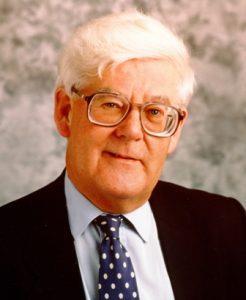
Nikki King MBE, who led a management buyout of Isuzu Truck UK in 2004, said of Harvey: “John was my mentor for 20 years and I couldn’t have done the MBO without him.”
A Cambridge graduate, Harvey joined Anglo-Dutch conglomerate Unilever in 1957 and 11 years later led its investment in one of the pioneers of contract distribution, Tibbett & Britten, which was founded in 1958 by John Tibbett and Frank Britten.
After 18 years of diversification and growth, in 1984 Harvey led the management buy-out of Tibbett & Britten and masterminded its global development across 34 countries, winning a Queen’s Award for Export Achievement along the way.
In 1986 the company was listed on the London Stock Exchange, when it was described as “fast-moving” and “one of the world’s leading logistics companies offering warehousing, distribution, and logistical support services, including “pre-retailing” services”.
Market leader in the United Kingdom, Canada, and South Africa, Tibbett & Britten was also strong in the US, Europe, Africa, Middle East and Far East, focusing on the FMCG sector as well as its speciality as a clothing distributor. Its fleet of more than 8,500 vehicles ran mainly in the livery of its clients which included Asda, C&A, Marks & Spencer, Black & Decker, Colgate-Palmolive, Next, Nestlé and Sainsbury’s.
By 2003 the company was turning over £1.6bn and employed nearly 40,000 people and in 2004 it was sold to Exel for £328m, a year before Exel was itself acquired by Deutsche Post to create what is now DHL Supply Chain.
In 2004 Harvey co-founded The Keswick Enterprises Group with Geoff Gillo and became chairman of this UK-based international private equity investor.
In 2011 Harvey revived the Tibbett brand in Romania after Keswick acquired Romanian firm Delamode Logistics and its joint venture with DHL, DHL Delamode, in December 2010. Both were rebranded as Tibbett Logistics and Tibbett Retail Services a year later.
While Harvey remains closely associated with Tibbett & Britten he has wide ranging interests. He was chairman of international freight forwarder Unique Logistics from 1992 to 2005 and from 2000 to 2005 was an advisor to the environment department.
He has been a non-executive director of Dawsongroup, New Covent Garden Market and the Institute of Grocery Distribution, a vice president of the Chartered Institute of Logistics & Transport and chairman of the Cranfield Centre for Logistics & Transport.
Harvey has been a long-standing supporter international transport development charity Transaid, for which he remains an ambassador. He chaired Transaid for over 10 years and is now described as a “great ambassador for the industry”.
Peter Acton, chairman, Logistics Leaders Network and former editor, Motor Transport
Peter Acton became the youngest editor of Motor Transport when he was appointed in 1984 at the age of 32.
Two years later he launched the Motor Transport Awards, which ran every year – even in 2005 when the London bombings on 7 July meant the awards had to be postponed til later in the year - until 2020 when Covid-19 forced their move online.
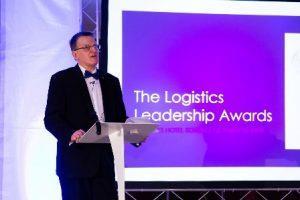
Acton’s passion and enthusiasm for championing transport and logistics causes for over 40 years remains undimmed.
Initially, he used his MSc in traffic engineering and transport planning to be part of the team designing the M25 motorway in north and west London. He then embarked on an interdisciplinary higher degrees scheme PhD in marketing innovative transport solutions with Dunlop.
Abandoning the academic life, turned to journalism, writing about “what he knew about” first as editor of Transport, the journal of the Chartered Institute of Transport and Surveyor, the local authority publication, before moving to Motor Transport, where he also created the Top 100 operator listing survey and re-vamped the Motor Transport cost tables, which became the industry standard for haulage operating costs.
Under Acton’s editorship, Motor Transport won the Brewery Transport Advisory Committee’s journal of the year title.
In 1988, Acton launched Distribution Business, the first magazine dedicated to emerging contract logistics sector in the UK.
At the same time he developed a very successful logistics and transport PR and marketing business working for major clients including TDG, Parceline, United Transport, Russell Davies, Paragon Software Systems and DTS Logistics. He also set up the Logistics Consultants Forum, the Logistics Directors Forum with the CIT and HR Directors Forum and managed the Youth Transport Challenge with the CILT UK.
In 1999, Acton was appointed secretary of the Transport Association, a position he held for nine years championing the cause of the family-owned, medium-sized haulier. He was also a trustee of Transaid for six years and has since been an ambassador for the organisation.
Acton was elected to the Court of the Worshipful Company of Carmen, the City of London livery company for the transport industry in 2015 having been a liveryman and freeman of the City of London for 25 years.
He has also been a member of the council of the CIT for three years and was on the marketing committee of CILT UK for 10 years as well as being a judge in its transport journalist of the year competition. Recently, Acton has been elected to the Board of the Humanitarian Logistics Association.
In 2010 Acton launched the Logistics Leaders Network to provide a platform for emerging logistics leaders to share best practice, meet like-minded professionals and be exposed to the latest innovations.
The Logistics Leaders Network is currently celebrating its 10th birthday running: a series of focus group practical workshops, an annual lunch, the Logistics Leadership Awards and dinner, attended by over 500 logistics professionals, and an annual publication Logistics Leaders seen by 5000 logistics professionals showcasing how logistics makes a difference.
The CILT UK recognised Acton’s contribution to transport and logistics presenting him with his 40 year Fellow certificate and badge in May 2020, a badge he wears with pride.
Tony Pain, business consultant and former marketing director, DAF Trucks
One of the best known figures in the UK transport industry, former DAF Trucks marketing director Tony Pain retired on 4 October 2013 at the age of 63, 45 years to the day since he started work at Leyland. Since then on his LinkedIn page he described himself as a “semi-retired marketing consultant” and he is often to be spotted meeting old friends at road transport industry events.

Pain got into the job because he always wanted to design trucks, but says he stayed because of the people.
“Anybody can be close to the people in their own company but it goes beyond that to the dealers and ultimately the customers,” he says. “I can’t think of many industries where we would regard customers as friends. It isn’t that big an industry and by and large they are a nice bunch of people.”
If you accept that today no one builds a really bad truck, he says the key differentiator has to be after sales service – an area where Dafaid has come to be recognised as the gold standard.
“A lot of it is down to trust and relationships,” he says. “What makes people come back and buy another one is because you delivered on what said you were going to do. It is all about the dealer network and the service side – everyone accepts that trucks break down and it is what you do when it happens that matters.”
Like many in the haulage industry, Tony Pain originally had a strong connection with farming.
Brought up on the family farm, he was more interested in things with four wheels than four legs. “At that time in the 1960s there were really only two companies that did both tractors and trucks – one was Ford and the other was Leyland,” he says. “Leyland was in its heyday and the year I joined – 1968 – was the year it had merged with what was BMC, so it was this huge empire exporting all over the world.”
Pain started off on a conventional apprenticeship but quickly got onto a university mechanical engineering degree course. “I got my degree and haven’t done a day’s engineering since,” he says. “So in that sense I am a failed engineer. But I did engineering because ever since I was a kid I wanted to design trucks.”
In 1987, DAF took over Leyland Trucks, and Pain had the difficult job of merging the two product ranges in the UK before spending several years travelling the world on the export side of the business.
In 1992 Pain returned to HQ in Thame to become marketing director of what by then was DAF Trucks, which at the time was vying for market leadership with Iveco Ford, a battle it would win for the following 17 years
.On his retirement in 2013 Pain had no plans to completely leave the industry he loves, saying: “If anyone would pay me to beat up the government and tell them how efficient trucks are I would love to do that. I also wouldn’t mind getting more involved in my local village community or some charity work. After being in business with so many people for so long, just to drop into nothing isn’t for me.”
The Downton brothers
CM Downton became part of UK logistics group EV Cargo in November 2018, ending 60 years of family ownership. The Gloucestershire-based 3PL was run for the past 30 years by brothers Andy (MD, centre), Richard (finance, left) and John (operations) Downton, who together made Downton one of the UK’s most successful logistics businesses.
Duncan Eyre, who succeeded Andy as MD, says: “The Downton business has a deep history in the UK distribution sector and is successful because of the way it has been managed and the ethos that runs throughout the company. There’s vast experience and a great deal of loyalty and respect across the workforce and customers.
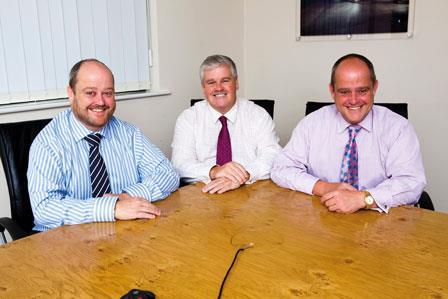
“I’m here to build on that unrivalled heritage to ensure we are best-prepared to take full advantage of growth opportunities and continue to deliver the best possible service to customers. Over time, and with the help of the Downton brothers in their non-executive roles, we will use complementary experience and the latest technology and reporting to strengthen the company’s offering further and continue that success.”
CM Downton was formed in 1955 when farmer Conrad Michael Downton invested in a tipper and began moving small loads around the county to supplement the modest income from the farm. He got involved in major projects in the south-west – such as building the M5 and the construction of the approach roads to the Severn Bridge – and by the end of the 1960s, Downton had built up a fleet of tipper vehicles.
In the early 1970s, Downton bought its first articulated lorry and soon had more than a dozen HGV vehicles. Downton diversified beyond construction and began its long association with the drinks sector, working for Bass Brewers and the Flowers Brewery.In 1985, Conrad Downton died at the age of 52 and his three sons and daughter Kate took over the business. Under their stewardship, Downton continued to expand and diversify focusing on the drinks and publishing industries, where it has established itself as one of the leading players.
In 2012, Downton was named Motor Transport Haulier of the Year, an accolade that was, in part, a reflection of its incredibly strong business performance. In an industry characterised by brutally low margins, where hauliers are often confronted with the unpalatable choice of buying unprofitable business or protecting profit at the expense of turnover, Downton achieved the remarkable feat of boosting turnover and operating profit. Downton’s 7% return on sales while maintaining strong revenue growth was described as “spectacular” by one judge on the selection panel.
Andy Downton put the firm’s success down simply to “traditional family values and customer care” and the close involvement in running the business by the Downton family.
“A lot of people do not believe in family businesses, which saddens me immensely,” Downton says. “We have surrounded ourselves with clever people but they all have to understand the way we think. If one of us isn’t happy with a deal we will walk away, but when we do come together we are a solid force and we go for it.”
Although Downton has expanded dramatically over the past 60 years, the core principle of the business remains constant – Downton will always deliver, no matter what.
Graeme McFaull, chairman, Suttons Group
Graeme McFaull has been chairman of Suttons Group since 2016 but is probably best known for his five-year stint as CEO of Wincanton from 2005 to 2010 and for his role as chairman of Transaid for seven years between 2009 and 2016. Ever ready to serve the logistics and transport industry, he was also elected president of CILT in 2009.
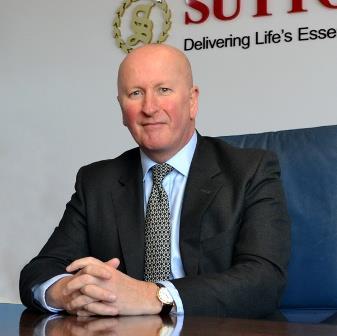
Since 2011 he has been operating chairman of Delin Capital Asset Management (DCAM), a leading real estate company specialising in European logistics. McFaull stepped up to the top job at the UK’s largest listed logistics business Wincanton after two years as MD of its UK and Ireland business and was instrumental in securing the firm’s position as a major force in European logistics. A chartered management accountant, he joined Wincanton in 1994 as finance director of the retail division, after spells in finance with Geest, Cargill and Pepsico.
Paying tribute to McFaull’s time as chairman of Transaid, for which he has also undertaken several gruelling fund-raising cycle rides, the charity’s CEO Caroline Barber says: “This was a time of growth at Transaid and saw the expansion of road safety and access to health programmes in Nigeria, Zambia and Madagascar, helping the organisation to get to where it is today.”
On his appointment as chairman of the board at Suttons Group following the death of the former long-standing chairman Michael Sutton, group CEO John Sutton said: “The group’s board is unanimously agreed that Graeme is an ideal candidate to chair Suttons at this exciting stage in the company’s history. Graeme’s leadership abilities, coupled with his significant board experience and knowledge of our dynamic industry, will be invaluable to the ambitious, competitive, global group that Suttons has become.
“Graeme has significant experience in the management and chairmanship of logistics and supply chain businesses. He understands the competitiveness of our industry and also has a strong empathy with our culture and commitment to serving our customers.”
Michael Cundy, MD, Tankers, at Suttons, added: “Graeme brings outstanding leadership qualities and vast experience to our business. He provides robust challenges but always in the most supportive way and he has contributed significantly to the strategic development of our business over the past few years.”
Thomas van Mourik, chief executive, Culina Group
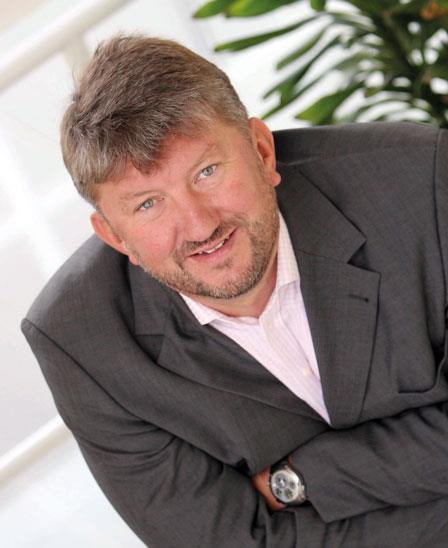
Culina chief executive Thomas van Mourik founded the business in 1994 on the back of volumes from Müller Dairy’s. In its first year it had a turnover of £7.5m, last year it achieved a turnover of almost £500m – built in no small part through an exhaustive acquisition strategy, adding diversity and specialisms to its core business. As a result, it is one of the top players in the ambient and chilled logistics markets in the UK. What does van Mourik put his success down to? Last year MT caught up with him at the company’s Markham Vale, Derbyshire DC, formerly owned by one of those recent acquisition targets – Great Bear Distribution – where he discussed his approach to business.
“I was invited to a conference [last year] where I had to speak about the key success factors of Culina Group,” he recalls. “So I got my marketing guys to buy a bottle of mayonnaise and take the label off, and put on it Culina Sauce. It was on the stand and everyone was looking at me thinking what the hell is he going to talk about. I said that I had a big learning curve with Cert Octavian [which Culina acquired in 2012] where I didn’t do it so well. That was because we did not pour the Culina Sauce all over those businesses.
“We kept the successful ones as they were: the management, the systems, the way of working. The only thing we did was give those companies support as and when required and when it suits them, HR, IT, finance. You name it. We change the logo and give it a bit more of a corporate feel. But that is as far as our involvement goes.
“It is well understood now that if you buy a business like Great Bear, people identify themselves with that. If you walk in there and start to call it Culina, you will annoy a lot of people who have poured their heart and soul into that business. Our business is all about people,” van Mourik insists.
It would also be fair to say that, Great Bear and Cert Octavian aside, Culina makes acquisitions of businesses that are not household names. How does van Mourik identify acquisition targets? “Thirty years’ knowledge. That’s it,” he says. “We know exactly where we want to play, which is Ireland, the UK, and across every temperature regime. The rest is all about how I can develop skill and find he right businesses that fit our group strategy.
“God knows what the future will bring; maybe we do something chilled or something frozen. Who knows? But I know all the players and I keep a very close eye on everybody’s performance. We never used a consultant to do any of our acquisitions. We do it with a very close team and nine times out of 10 you would not know we are doing it until we announce it. We keep a very close lid on it. If you don’t do that it will have a breaking effect or your next move and your next move,” he explains.
“Plates are always spinning and some come off. They can be going for years and all of a sudden you land it. It can go very quick or very slow. The fact we have had a few come off in recent years is because we are working very hard, and we will continue to do so.”
Anne Preston MBE, chairman, Prestons of Potto
Anne Preston MBE is chairman of the family haulage firm Prestons of Potto founded by her late husband Richard and his father Dick in 1957. The couple married in 1960 and worked side by side until Richard passed away in 2015, leaving Anne at the helm.
Preston, who turned 80 in 2017, was awarded her MBE for services to the transport industry in 1987, was named the 2010 Everywoman Director of the Year Award for Logistics and was the first female board member of the Road Haulage Association.
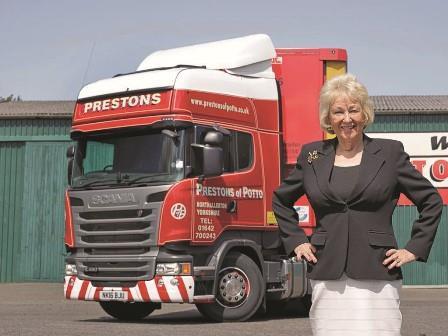
She joined the firm in 1965 soon after the birth of her two children, David and Jayne, and together with Richard built the business from one vehicle to a nationally recognised and highly respected haulage firm.“I’ve worked in this industry for 51 years,” Anne told Commercial Motor in 2016. “I can’t think of another woman who can say that. I think it’s quite an achievement.”
Always a great team, Anne looked after the finances and customer relations while Richard was more hands-on in the running of the firm. Both came from farming and transport backgrounds – Anne’s father Alf Wade was a cattle haulier and the firm still trades as A Wade & Co of Northallerton. David Preston is MD of the firm which is now employing the fourth generation of the Preston family. Still based in Northallerton, north Yorkshire, it has a fleet of over 100 vehicles, four depots across the UK and a turnover of around £17m.
A pioneer of petrochemical transport in the 1960s, Prestons developed the plastic liners for containers that are still used today, and ICI was one of its longest-standing customers. The firm was quick to realise the value of the presentation of the fleet, making sure its distinctive red and yellow liveried vehicles were always immaculate. A member of the Pall-ex network, Prestons today runs a mixed fleet of curtainsiders, flatbeds and heavy haulage equipment as well as offering a range of supply chain solutions including 120,000ft2 of warehousing at its 30-acre site at Stockton on Tees.
The title Everywoman Director of the Award came in May 2010, the day before her golden wedding anniversary. She told a local newspaper: “I’m over the moon. There was some stiff competition in the awards but the most thrilling thing of all is that a small haulier on Teesside won out against some of the big national PLCs.
“It was extremely rare for women to go into this job. It’s difficult to juggle family because you can’t go home at three or four in the afternoon in this business.
“You have to be pretty tough and work harder as a woman but once people meet you, they don’t forget your name because there are so few women.”
Harold Montgomery, chairman, Ballyvesey Holdings
Harold Montgomery in chairman of Ballyvesey Holdings and has built an impressive empire of transport-related companies over the past 50 years, including Dukes Transport, Montgomery Transport, Commercial Vehicle Auctions, Montracon Trailers and DAF, Scania and Mercedes-Benz franchised dealerships.
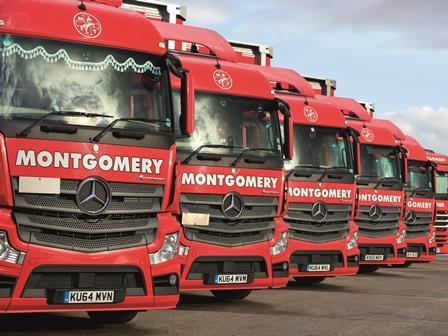
Based in Newtonabbey, Co Antrim, Ballyvesey is a financially strong as well highly diversified group, making pre-tax profits of £6.9m on turnover of £621.4m in the year to September 2017.
It employs over 2,600 staff around the UK and is a significant contributor to the UK transport industry. Montgomery has been involved in the industry since an early age and after five decades in charge of the business is still described as an inspirational leader and a great example to any transport professional. It is his tireless drive and enthusiasm that has taken Ballyvesey from strength to strength.
It all started when Montgomery Transport started trading with one tractor unit and trailer in October 1970, which evolved from Montgomery’s first ever venture into business, buying and driving an ‘S’ model Bedford tipper in the late 1960s.
During the course of the 1970s the business grew from the one truck operation to around 50 vehicles by the end of the decade, focusing on the Irish Sea cross channel services.
In August 1977, the second company, again started from scratch, was Montracon, in a rented factory unit in Newtownabbey, Northern Ireland.
On professional advice, with the birth of a second company, Ballyvesey Holdings was formed as the parent company to these two entities with Harold Montgomery becoming chairman and executive MD.Ballyvesey continues to be privately owned by the Montgomery family to this day.
The group has over 20 operating companies, most related to truck sales, transport and logistics, transport services and trailer manufacturing, achieved through new start-ups, organic growth and several acquisitions.
None of this could ever happen without Montgomery’s drive, ambition and vision in leadership coupled with the support and teamwork of loyal directors, staff and employees in all areas of the group activities.He continues to be an active, hands on managing director of the group, despite passing the milestone age of 70 this year.
Leading by example, blessed with good health and an enduring passion for the business, Montgomery’s appetite remains to continue the development of the Ballyvesey Holdings organisation for this generation and the next.
John Ratcliff CBE, chairman, Ratcliff Group
John Ratcliff CBE is the former chairman of Ratcliff Group; former patron of the SOE (Society of Operations Engineers); Chairman and Vice President of the IRTE and a past Master of The Worshipful Company of Carmen – and can be credited, alongside his father, with designing the tail-lift.
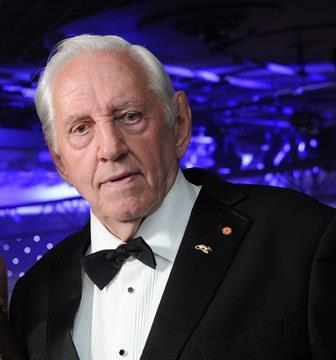
Ratcliff’s father, Ted, used to own a workshop for reconditioning commercial vehicles and engines. Growing frustrated with waiting for a crane to become available to hoist an engine off the back of a truck he designed what is believed to be the first tail-lift, so the engine could be lowered off the trailer without the wait.
The idea proved so popular that Ratcliff and his father decided to build and sell more, and from its base in Welwyn Garden City Ratcliff stormed the market during the late 1950s and 1960s. Sadly, Ratcliff’s father died in 1970, meaning that he did not see the continuing expansion and success of the company under his son’s leadership.
Innovation would remain at the heart of Ratcliff Group after Ted’s death too:in 1971 it bought Buttonwood Mechanical Handling while in 1972 it brought to market a demountable tail-lift – that could be fitted or removed using its own power-pack - for the Post Office. In 1974 it signed a reciprocal manufacturing and marketing agreement with Los Angles-based firm Maxon Industries.
The 1980s saw it acquire Cycles Peugeot and Hydrolift of Sweden, and develop the Solo – a simple, lightweight, all-electric tail-lift for panel vans. In 1990 the Ratcliff Group bought branched out and acquired Wessex Lifts – which makes mobility equipment for the disabled. And in 2001 John Ratcliff was awarded a CBE in the New Year’s Honours List for Services to the Road Transport Industry.
In June 2005 Ratcliff Group has sold Ratcliff Tail Lifts subsidiary to crane specialist Palfinger – turning the Austrian business into the British market leader for tail gates and access systems and creating a business with the widest rang of tail-lift models in the world. At the time Ratcliff Tail Lifts employed 200 staff at both Welwyn Garden City and its parts and service base in Garforth, Leeds. It had sales at the time of approximately £20m a year.
Ratcliff described the deal as a “nice transition for the core tail lift business” and remained chairman of the Ratcliff Group and its three main companies: Wessex; Stone Hardy (a commercial vehicle accessory service company) and Planet Flowline – which specialises in the design, supply and installation of machines for the food processing, drinks and packaging industries. He is still a director at the business.
Derrick Potter, chairman, Potter Space
The sale of Potter Logistics to WH Bowker in October 2016 saw the end of the Potter family involvement in road transport after more than 50 years. While this was the end an era as Potter Group - now Potter Space -relinquished its transport fleet and moved into property development, for chairman Derrick Potter the key fact was that the deal secured the future of the company’s 280 staff.
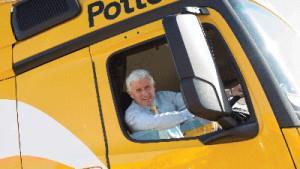
“I feel happy that in my tenure I’ve had colleagues around who’ve been able to achieve what we have and made this wonderful transition. We have a great future to look forward to,” he said.
While giving up control of the chemical, food and rail freight transport and warehousing firm he founded in 1965 and built into a highly profitable £26m a year business must have been a hard decision, Potter says the sale to Bowker was the best option for all concerned.“
Potter Logistics had grown very successfully, but it had grown in a number of areas, and actually had become quite a complex business,” he said. “There were a lot of tears shed by the family, about all our colleagues who are in the business. Bear in mind, they’d been with us a long, long time, and equally customers as well, a long time. We had decided we needed to find a like-minded company who saw the world like we did. Bowker came along and their vision was the same as ours.”
Naming Potter Logistics Motor Transport Haulier of the Year in 2015, the judges said it was a family business with a customer-centric ethos that had secured some very loyal, long-standing clients.
“We have a quite distinct structure,” said Potter. “We have the shareholders, we have the operating board, and then we have an advisory board in the middle that helps make the decisions for the long-term. Are we different? I blooming hope so.”
A leading light in the Transport Association, Potter has been a great believer in collaboration with other like-minded family hauliers.
“We used to bring 200,000 tonnes to our rail terminal at Ely,” he says. “We would use UK haulers to distribute them. We work with partners in other parts of the country. There are a lot of family businesses that are particularly good at knowing their own area, and their own customer base.”
Key to Potter’s success has been his caring attitude towards his staff, especially his drivers. Giving a special award to Potter in the 2015 UKWA awards, chairman Tony Mohan said: “When touring one of the company’s sites, I witnessed the fact that Derrick personally knew 100% of the staff. He understands that people are the most important part of a successful business. Over the 50 years, Derrick’s energy and enthusiasm has not waned at all.”
Potter is a farmer’s son, and he has always lived by some good advice his father gave him in the early days after he founded the firm with a single truck in 1965.
“He always used to say to me, ‘it’s your responsibility to look after your employees’. He always believed in that. He would say, ’if you want something from somebody, give them something. You might give them your time, your expertise, might even give them some money. Then you have a right to ask for something back.’
“I always remember to say please, to say thank you, to say well done, and hopefully with a smile. They cost nothing, but they mean everything.”
William Stobart, executive chairman and former chief executive, Eddie Stobart Logistics
William Stobart (born 10 November 1961) is the fourth and last of Eddie and Nora Stobart’s children – and younger brother to John, Anne and Edward. Although he was the youngest by seven years in a family dynasty that has dominated UK haulage and logistics to this day, he shared a passion with his older brother Edward for all things trucks.
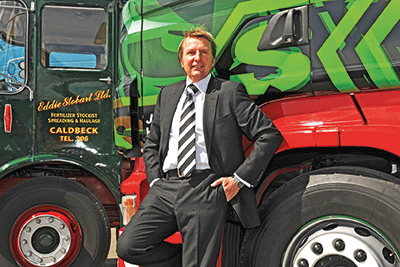
While his older brother Edward was fast-tracking his way up the management chain to become chief executive officer of his father’s business, William kept himself busy driving tractors, cement mixers and eventually a full-blown wagon driver – passing his test just a week after his 21st birthday. His first truck was a Scania 112 intercooler – and he would spend the next three years as a driver working for his brother before he started working on the traffic desk.
From Stobart the man starting gainful employment at the firm that bares his surname in 1977 Stobart the business went from strength the strength over the next three decades under the leadership of his brother. He’s carried out pretty much most roles at the business during this time and he developed an in-depth understanding of the business on every level during that time.
He left the business in 2001 to join WA Developments – a civil engineering and rail infrastructure business run by his old school friend and former brother-in-law Andrew Tinkler. But he wouldn’t be away from transport for long. In 2003 WA Developments bought Eddie Stobart Group – with Edward stepping down and William becoming managing director.
In 2007 Eddie Stobart Group was sold in a reverse takeover to the Westbury Property Fund, creating Stobart Group, and listing on the London Stock Exchange. Following the float, William became chief operating officer of Stobart Group. Over the next two years it would make three acquisitions: container haulier O’Connor Group; James Irlam & Sons and the chilled operation of Innovate Logistics out of administration.
In 2011 William (alongside David Irlam) stepped down from the board at Stobart Group to give him more time to focus on the core transport business – but that would pale in comparison to the sad events of that year – when his brother Edward died on the 31 March.
Despite the family tragedy the firm carried on from strength to strength: it entered a joint venture with fellow Cumbrian firm AW Jenkinson to form a 50:50 joint venture now known as Stobart Biomass. This joint venture has often been at the forefront of Stobart’s vehicle procurement strategy – leading on major orders with Scania (there have been five such deals since 2010 – most recently for 2,000 units in 2016). In 2012 Stobart acquired automotive logistics provider Autologic. However 2013 would prove to be a rather more turbulent year for the business, with the former Innovate chilled network closing and a boardroom struggle over the performance of the group.
In 2014 William made a return to the board at the newly formed Eddie Stobart Logistics. Stobart Group sold a 51% stake in the company to private equity firm Douglas Bay Capital – effectively taking the transport business into private hands with William as chief executive. A year after that deal, William stepped up to executive chairman, with former Tesco distribution director Alex Laffey taking chief executive responsibilities.
2014 was a pivotal year for William, with his son Edd setting up his own haulage firm – WS Tranportation – entirely separate to the Eddie Stobart Logistics business.
Stobart has never been afraid to lead with technology too: William has been a vocal advocate of the longer semi-trailer trial, and has also rolled-out roll-out of aerodynamic kits for its fleet developed in partnership with Wirth Research – the aerodynamics company founded by former Benetton Formula 1 chief designer Nick Wirth.
Eddie Stobart Logistics put in a strong financial performance under William and Laffey, disposing of the former Autologic business to BCA Automotive in 2015 and in the year ended 30 November 2016, revenue from continuing operations was £549m (2015: £468m) with adjusted EBIT of £41m (2015: 36m). In April it floated on the Alternative Investment Market in a blockbuster listing that valued the business in excess of £550m, and just before the IPO William stepped down as a director.
John Williams, group managing director, Maritime Transpo rt
If Maritime Transport group MD John Williams secured his place in the Hall of Fame for his innovative approach of successfully combining container haulage with retail distribution, he cemented it with a pragmatic yet caring approach to drivers.
The rise and rise of Maritime started when Williams led the deal to acquire Maritime in 2001.“I had this burning ambition to be my own boss, specifically to own a transport company, because that’s really all I know. Apart from working here at the port for three years, and Securicor and DHL for five years, container transport is what I know.
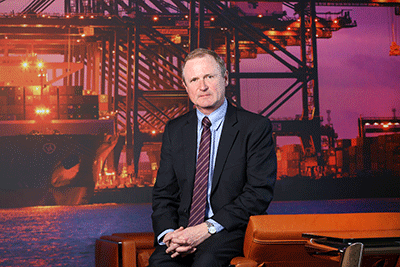
“I wanted to get back to that, and so this opportunity came along to buy this transport company called Maritime Haulage, and I succeeded in buying it on September 4 2001.”
At the time it had 136 trucks and turned over £18million – “but I don’t think it was making any money,” he recalled.
“It was in poor shape, and a week later we had the appalling attack in New York. We were out seeing customers and we were in a pub in Liverpool. I thought ‘I’m 43 years old and I’ve just mortgaged my house to provide the security to buy Maritime Haulage’. I don’t think I slept that night.”
By 2009, Maritime had grown to a £70m annual turnover, without making any acquisitions – but that was about to change.
The credit crunch and subsequent collapse in container volumes brought two “spectacular opportunities,” said Williams. “DHL decided to withdraw from the container transport market. We were the only people with the capability - and the courage - to acquire it because the market was still rough.”
That was followed by the 2014 acquisition of Roadways, reinforcing Maritime’s position as the UK’s largest container haulier and completing its UK network of 23 depots.
“Container transport has always been seen as a really hard place to succeed, and a pure container transport company, operating on the old model, would become extinct pretty quick,” said Williams. “So in 2010, we decided to break into distribution with curtainsiders. We learned so much about utilisation, double-shifting, weekend working, Bank Holiday working and cross-utilising container trucks and distribution trucks and equipment. I think we were one of the few companies that have been able to pull this off on the scale that we’re doing it.
“I hate to use the word ‘game-changer’; it’s over-used, but it certainly was for us.”
According to Williams running a successful transport business doesn’t have to be complicated.
“We’ve concentrated on the simple things,” he said. “The essence of a transport company is the driver, the truck and the people that put the two things together. We focus specifically on that, so in terms of the drivers, we have what we believe is a strong driver culture here.
“We spend an awful lot of time with the drivers, getting to know them, listening to them.”
Williams has a policy of only using employed drivers and has over 1,400 on the books. Despite his reputation as a tough boss, Williams believes strongly in treating drivers fairly and providing the best possible facilities, rather than paying over the top wages, is the way to keep a loyal, committed workforce.
The driver rest and recreation areas at the Felixstowe head office would put many a five star hotel to shame, and Williams aims to upgrade other sites too.
“We’ve invested in great facilities and we’re doing the same in Birmingham, Nursling and Leeds. We want safe, secure, spacious parking for our drivers so that they can get a proper rest and a proper shower,” said Williams. “We give them a smart uniform, and we give them death in service benefit. I think we look after our drivers as well as we can, and they genuinely believe that we look after them and care for them.”
Ray Grocott, chairman, Grocontinental
A larger than life character typical of his generation of entrepreneurial hauliers, Ray Grocott has served the industry for over 50 years.
Still chairman of Grocontinental, the highly successful distribution firm founded by his father, he has grown and transformed the business from a small regional haulier to a major international organisation.
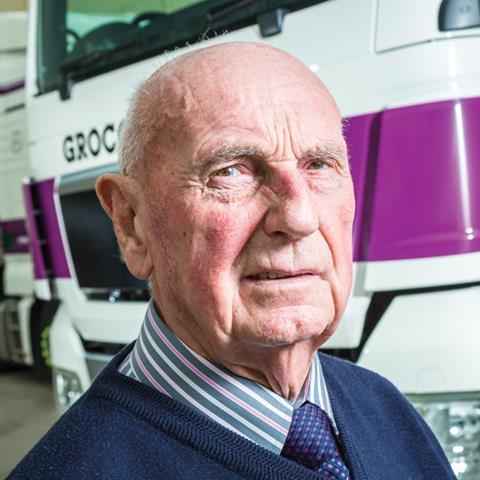
Grocontinental – Motor Transport’s Haulier of the Year in 2011 – is today one of the country’s leading storage and distribution companies with an annual turnover of £28 million.
As the son of the founder of Grocontinental, Ray has been part of the family business since 1950 and was the driving force being the development and continued expansion of the company. A true entrepreneur whose ambitions, innovative marketing and ability to take calculated risks in the early days of Grocontinental paid dividends.
Grocott plays an active role in business development for Grocontinental and maintains strong working links with the company’s continental customers.
He has remained true to the strong working-class values instilled in him by his pioneering mother, Nellie Grocott, who, when left widowed in her 30s, established the business in its early days. His feet have always been firmly planted on the ground.
In spite of his personal drive and ambition, he also has the humility to relate to people. He cares hugely for his staff and the community that his business operates within.
He is tenacious, generous, uncompromising, shrewd and instinctive. He won’t be defeated by bureaucracy and negativity. He is never afraid to speak his mind and will campaign tirelessly for what he thinks is right for his business and his industry.
Grocott has always been extremely proud and passionate about representing the road transport Industry. He is a past chairman of the International Road Haulage Association and is still active in both this organisation and the Transport Association. He is highly respected and is a true ambassador of the industry in both the UK and Europe.
Ray is a true philanthropist and is conscious of his responsibility to his local community. He is very generous and always looking to help people.
He gives generously to local charities and good causes and he is chairman of the local sports and recreation club where he has worked tirelessly to raise funds and leverage government funding.
In 1992 Grocott embarked on a charity mission to help Romanian orphans, co-driving one of the vehicles laden with bedding, clothing and food on the trip.
Michael Williams, former group chief executive, Dawsongroup
Mike Williams had been with the company for over 40 years before retiring due to health reasons in October 2016. Starting as sales development manager in the truck rental side of the business, his obvious talent and enthusiasm saw him rise to become managing director of Dawsonrentals: truck and trailer in 1979.
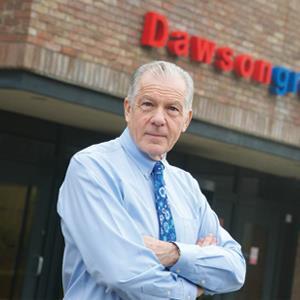
Williams then worked tirelessly with customers, suppliers, service networks and his own team, to take that business to a position of dominance and reputation that was perhaps unusual for an independent, family-owned business in the rental and leasing sector.
As Dawsongroup grew to encompass other key asset groups, such as bus and coach, mechanical handling, vans, temperature control facilities, sweepers and finance, his personal drive and deep understanding of the rental and leasing business saw him elevated in 1993 to the position of group chief executive. Working closely with chairman, Peter Dawson, and his own carefully selected senior team of individual business managing directors, Williams has contributed to and overseen a period of consistent and impressive growth for the group.
Noted for an acerbic wit alongside his drive and commitment to the business, Williams has been a formidable player in the industry throughout his working life. Demanding of those around him – both staff and suppliers – he has been a dominant figure on the rental and leasing landscape. That toughness however, has always been tempered by a reputation for fierce personal loyalty to his team, many of whom have now been with him for well over 20 years.
Asked a few months ago to sum up his success, he said: “Taking care of customers, being fair to suppliers and setting the pace for our team – fortunately they all know what’s needed and are very capable of delivering.”
Chris Hanson-Abbott OBE, founder, chairman and chief executive, Brigade
Chris Hanson-Abbott formed Brigade Electronics in 1976, after he was inspired by a strange beeping sound he heard emanating from the rear of a small truck on a street in Tokyo.
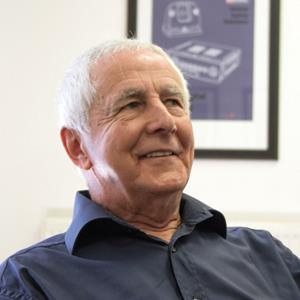
This was Hanson-Abbott’s Damascene conversion moment and he set about finding out who made the alarm. The answer was the Yamaguchi Electric Company who, impressed with his youthful energy and enthusiasm, granted him the UK and Europe agency for the alarm. Today the Japanese company remains a major supplier.
In the mid-1970s reversing safety had not been addressed outside of Japan, but it accounted for a quarter of all fatalities at work in the UK at the time. The Health & Safety at Work Act was passed into UK law in 1974: it was clearly the time to address the problem.
With support from the Society of Motor Manufacturers and Traders (SMMT), Brigade launched its first reversing alarm at the 1976 Commercial Vehicle show in London. According to Brigade, the reaction was mixed and the show ended without a single sale. To add insult to injury the publicity culminated in the Department for Transport announcing that reversing alarms contravened the Construction & Use Regulations – and were thus illegal. Apparently the reversing alarm was the same as a horn, and not ‘continuous, uniform and strident’. Undeterred, Hanson-Abbott continued, lobbying the government over a period of five years and challenging potential customers’ preconceptions.
Thankfully the government finally saw sense and over the years the legislative environment has evolved enormously. Today, road safety is at the forefront of operators’ minds – be it protecting vulnerable road users and pedestrians or staff and customers – and Hanson-Abbott continues to make devices that saves lives throughout the world.
Turning that world on its head, reversing alarms now face lobbying pressure as the source of environmental noise pollution. Hanson-Abbott addressed this moving into the realm of white sound – an unobtrusive sound that is easier for the listener to identify the direction the noise – and therefore the vehicle – is coming from. With advances in white sound coming in the late 1990’s Hanson-Abbott has transformed the very market he created over the past 20 years, eradicating the traditional alarm sound for a safer technology.
Hanson-Abbott is a passionate speaker and advocate for road safety who has built a world-leader in vehicle-based safety equipment. Even though he is in his 80s he is still very much involved in the business activities of Brigade.
SERVICE TO INDUSTRY WINNERS
2006: John Parry
2007: David Batty
2008: Ken Irlam
2009: Robbie Burns
2010: Dick Denby
2011: Stewart Oades
2012: Nikki King CBE
2013: Peter Carroll
2014: Des Evans OBE
2015: Theo de Pencier
2016: Glyn Davies
2017: Ray Ashworth
2018: Paul Day
2019: Carole Walker
2020: Thomas van Mourik
2021: Donald Burton
2022: William Stobart
2023: Steve Granite













